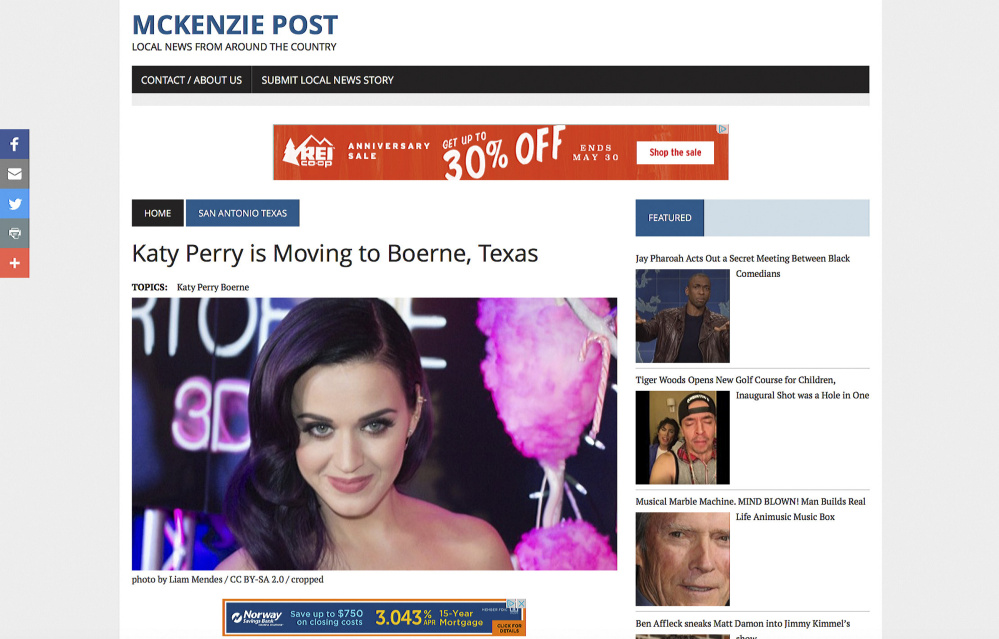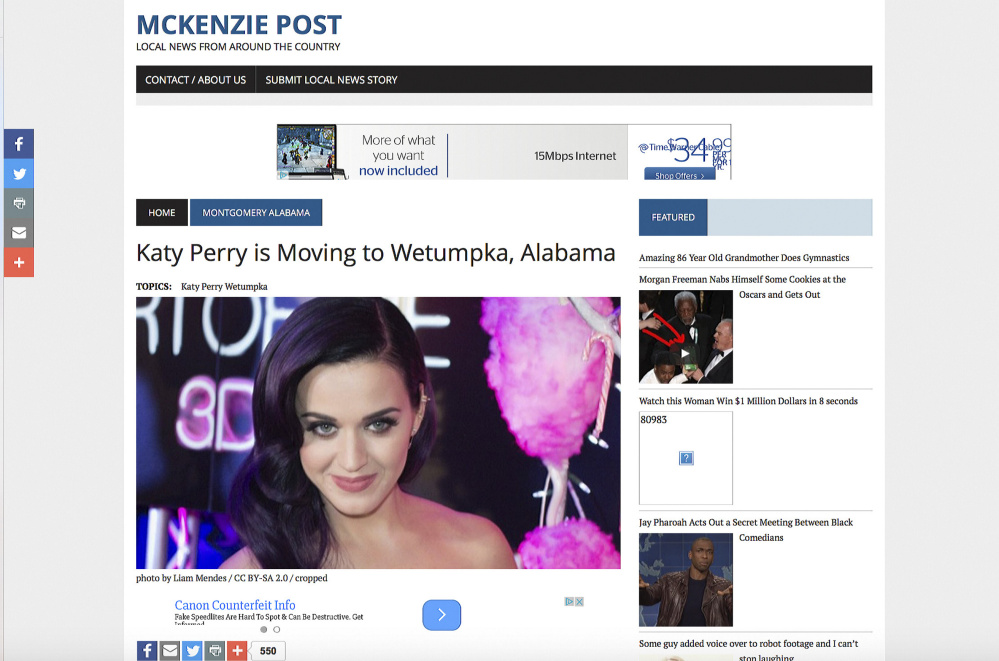First, in early March, came the exciting news that pop singer Katy Perry was moving to Portland. “I love Portland! And this feels like the place I need to be at this time in my life,” Perry was quoted as saying on the MBY News website.
A few weeks later, a story from the KSPM 33 website – labeled as “Your Local News Source” – announced that a Harry Potter spin-off movie would be filmed in Maine.
Both of these items, further proof of what a wondrous and magnetic place Maine is, were shared by eager locals on Facebook. Both were false.
The online stories mentioned above are part of the growing “fantasy news site” phenomenon. Fake news stories lure readers to a site, and each reader click helps to support that site’s paid advertising. Reporters and others have tracked dozens of these sites in the last two to three years. With names like National Report, McKenzie Post and even abc News, the pages look like many other news or entertainment sites. But if you click the “about” tag on many of them, you’re directed to a disclaimer explaining that you’re reading a fantasy news site and that the stories are not true.
While some of the sites’ creators say their stories are clearly parodies or satire, some academics, journalists and readers worry that a barrage of fake or parody news stories further obscures the already blurry line between fact and fiction online.
These sites confirm the fears of many cultural observers, who say the internet increasingly allows people to read only items that are in line with their beliefs or biases, even if those items aren’t true.
The Maine examples of fake news were celebrity-based. Other sites make up newsier-sounding stories with a definite political slant, including one about a U.S. company hiring mercenaries to kill Islamic State militants.
In early May, a story on the website abc News reported falsely that NBA legend Michael Jordan was threatening to move the Hornets out of North Carolina if the state did not revoke a law denying transgender individuals access to restrooms according to the gender they identify with. It sounded like something that could happen – Jordan did issue a statement saying he opposed discrimination and wanted everyone to feel welcome at Hornets games, though he never threatened to move the team – and it was something people on both sides of the issue would react to. The story was circulated widely as true.
SYMPTOM OF A LARGER PROBLEM
Some scholars and media critics say the incredibly polarized political climate right now can be linked to the way the internet allows and encourages us to consume information. On Facebook, for instance, people become “friends” with like-minded people and then get news stories, editorials and other information from them. Almost anywhere you go looking for information on the internet, you’ll be offered more stories that are similar to the ones you just read, and in line with your own biases and beliefs.

Portland, Maine, or Schaumberg, Illinois? Either city could be the perfect place for a Harry Potter spin-off.
Fake news sites “are symptomatic of a larger problem, a breakdown in trust, to the point where no one can agree on a shared narrative on virtually any topic,” said Caitlin Dewey, digital culture critic for the Washington Post, who spent more than a year debunking online falsehoods for the column “What Was Fake on the Internet This Week.” “In the big picture, it seems to not matter to a lot of people whether something is empirically true or not, because people are choosing what to believe.”
Several other organizations are devoting time and effort to fact-checking fake stories. Snopes.com started as a website for debunking urban myths about 20 years ago, but the staff now spends a lot of its energy fact-checking internet hoax stories.
The internet has helped create “bubbles” in which many of us live, consuming information that suits us while blocking out contrasting views, said Mark Kingwell, a philosophy professor at the University of Toronto focused on the internet’s impact on society. If people can’t tell what information inside their bubble is true or not, they may be more likely to accept whatever fits within their perception of reality.
The tendency of people to seek out information that confirms their existing beliefs or opinions is known as confirmation bias, Kingwell said, a condition enabled by the internet.
Everything on the internet looks sort of the same, King- well notes, so at first glance most people don’t give more weight to one page over another. It’s not like browsing a supermarket news rack, he said, where it’s easy to discern a mainstream newspaper from a gossip-filled tabloid or a glossy showbiz magazine.
“It’s really easy for these (fake news sites) to create something online that looks as authoritative as anything else,” Kingwell said. “If I want to live somewhere that’s exciting and desirable, than I can choose to believe those stories (about pop stars and movies coming to Maine). Whether things are fact-checked matters less than getting the pleasure of reading something I wish to be true.”
EASIER AND LUCRATIVE
Creating a Web page today is as easy for most people as writing a letter was in an earlier age. In fact, there are places on the internet where anyone can get a page that looks like an established news source, including the homepage of the New York Times, and put their own content into it.
In late February, a fake New York Times story was circulated on the internet claiming that Sen. Elizabeth Warren, a Democrat from Massachusetts, had endorsed Bernie Sanders for president. The Times ran a story explaining that the story about Warren’s endorsement, including made-up quotes from Warren, was a fake. It appeared to have been created on CloneZone, a website that allows people to make and circulate their own versions of popular sites. The fake New York Times story was viewed at least 50,000 times and was shared 15,000 times on Facebook.
The motive behind many, if not most, of the fake news sites is money. The sites cost little to make. And because the stories are fake, the creators can write stories and headlines calculated to attract attention. The more people click on the fake stories, the higher the rates the fake news sites can charge advertisers.
Some of the advertisers that appeared on the fake Perry and Harry Potter stories, through Google advertising, were Volkswagen, Ziploc, Glade, U.S. Cellular and TD Bank. Creating a misleading or inflammatory headline or story for the sole purpose of getting someone to open and read it is often referred to as clickbaiting. And a good way to get people to click on a story is to tell them something exciting or weird is happening in their town. Several versions of the story about Perry moving to Portland, for instance, were posted at about the same time with different places listed as her new home. If you searched online between late February and early April, you could have found separate stories about Perry moving to Wetumpka, Alabama; Boerne, Texas; Danbury, Connecticut; Chico, California; and Portland, among others. People in each place, ranging from a couple of dozen to more than 150, commented on the stories.
The legality of fake news sites hasn’t been tested yet in any meaningful way, as the people being written about have to weigh the risk of a costly court battle against the benefit of having an item about them retracted. Media scholars said that fake news items usually meet the definition of parody or satire, and may be considered protected speech by the courts.
Under most states’ libel laws, plaintiffs would have to prove the false facts printed in a story harmed them or their reputation, said Michael Lambert, a legal fellow with the Reporters Committee for Freedom of the Press in Washington, D.C. Satire and parody, where truths are often blurred, are considered more opinion and are usually protected from court challenges, Lambert said. But not always. Lambert said a judge would consider whether a “reasonable person” would think the piece is satire or not, before making a decision.
Lambert said there are probably a lot of fake stories that could be challenged in court, but the subjects of the stories have to decide whether an expensive court battle is worth it. In the case of Jordan and the Charlotte Hornets, Lambert said, arguments could be made that the story helped Jordan’s reputation more than it harmed it.
Copyright and trademark law might apply to fake websites and stories, too, but again, bringing the suits might prove too difficult or costly, Lambert said. Copyright law is designed to protect created content. Trademark law protects words, phrases and symbols that identify something, Lambert said.
With copyright cases, courts have to determine whether the defendant’s use of someone else’s work constitutes a “fair use,” or one that promotes “the progress of science and useful arts,” Lambert said. In a trademark case, a court would look at whether a parody or fake story created confusion among readers, he said.
But in both areas, a host of other factors would come into play. Overall, Lambert said, the law usually comes down on the side of protecting free speech and different ways of expressing ideas.
“Both (trademark and copyright laws) are rooted in the same general values, free speech and free expression, and maintaining a marketplace of ideas that’s robust and where the public can comment and criticize without being afraid,” Lambert said.
WHOSE IDEA WAS IT?
One of the better-known creators of fantasy or parody news sites, Paul Horner, says his work is about expressing ideas. He makes money off his sites, but he says he wants to write “stories with a purpose and things that I feel passionate about.”
“I find stuff that I see wrong in society and expose it the best way I can. I think it is important to keep an open mind and understand that everything doesn’t have to be satire or like ‘The Onion,'” Horner wrote in an email. “I think of a way to educate individuals about that subject by writing a story that takes the subject matter to an extreme nature, something that makes people interested in reading it.”
The 37-year-old writer based in Phoenix, Arizona, started a political satire website in 2010 called Superofficialnews.com, and he was one of the original writers for the satirical news site National Report.
Now he runs seven websites, including Newsexaminer.net, Superofficialnews.com, iywib.com, and abcnews.com.co. (In an email, a spokesperson for the actual ABC News said it has “objected to the operator, who has a history of using the names of legitimate news organizations without authorization to post his fake stories.”)
Horner said his websites include political humor, hoaxes and “100 percent factual” stories. Running websites is Horner’s only job, and he said his income varies. He said he makes roughly $3 to $7 for every thousand visitors to his sites, and some of his stories that go viral have gotten a million or more views.
Dewey, the Washington Post digital media critic, said she’s been told some fantasy news originators can make up to $10,000 a month. When asked if he thinks his stories make it harder for people to know what sources to trust, Horner said he thinks his stories force people to check facts on their own. He said in an email that a satirical or fake news story “forces people who rely on Fox for their news to learn how to use Google.”
He said he’s never had any legal problems with his stories, partly because he always includes enough satire or humor to have them considered a parody in court.
The Michael Jordan story on his abc News site, for instance, begins with a fairly straight lead about Jordan announcing his threat to move the Hornets, followed by a realistic-sounding quote from Jordan and some explanation of North Carolina’s law. But then Horner inserted himself as a team spokesman. The story also included quotes from a spokesperson for Sock It Forward, “a group that provides the homeless and those less fortunate with brand new socks.”
SOUNDS TOO GOOD? CHECK IT OUT
Chris LaMontagne, a 34-year-old woodworker from Bowdoin, was one of the two dozen or so Mainers who commented on the Perry story when it first circulated in March. Most commenters simply welcomed Perry to Maine or invited her to their business. LaMontagne recommended to Perry that she visit Harpswell for “great seafood.”
LaMontagne said he believed the article could be true, because Maine does have a fair number of celebrities with homes here. When he found out that the story was from a fake news site, he was “not too impressed.”
“It’s frustrating. It’s hard enough now to weed out the real from the false online,” LaMontagne said. He worries that the lack of facts online leads to an increasingly polarized populace. “There are a lot less facts online, mostly opinion, and I think that’s changed how we interact with each other. Instead of thinking of the community overall, everything is about the individual.”
The Katy Perry item caught the attention of Ryan Gavin, an on-air and online personality for pop radio station WJBQ (97.9 FM) in Portland. Since WJBQ listeners are often interested in celebrity news, Gavin regularly investigates posts that involve musicians, movie stars, TV shows and Maine, to find out if they are true or not. He’s seen about a dozen in the past year that were false, including one about a home makeover show coming to Maine to help a family in need.
Gavin, 25, is part of a generation that grew up with the internet. Fake news succeeds, he said, because of how easy it is to share it, and how much fun it is to think these things are true.
“I think my generation, millennials, don’t have a healthy skepticism for what they see online, which is very odd to me since there’s so much skepticism about legitimate news organizations,” he said. “It’s a heck of a lot easier and more fun to share something and say ‘OMG’ or ‘LOL’ than to look at it with a skeptical eye.”
Send questions/comments to the editors.






Success. Please wait for the page to reload. If the page does not reload within 5 seconds, please refresh the page.
Enter your email and password to access comments.
Hi, to comment on stories you must . This profile is in addition to your subscription and website login.
Already have a commenting profile? .
Invalid username/password.
Please check your email to confirm and complete your registration.
Only subscribers are eligible to post comments. Please subscribe or login first for digital access. Here’s why.
Use the form below to reset your password. When you've submitted your account email, we will send an email with a reset code.